
- Homepage
- Author
- Alfred Bruneau (3)
- Beydts (louis) (4)
- Camille Mauclair (3)
- Charles De Gaulle (3)
- Charles Monselet (3)
- Chateaubriand (5)
- Colette (3)
- Ernest Daudet (3)
- Eugène Labiche (3)
- Jean Couty (3)
- Jean-léon Gérôme (5)
- Louise Read (4)
- Marcel Proust (5)
- Paul Chabas (4)
- Paul Meurice (3)
- Proust (3)
- Roger Martin Du Gard (4)
- Salomon Reinach (3)
- Sully Prudhomme (7)
- Violette Leduc (4)
- Other (4025)
- Binding
- Era
- 18th Century (11)
- 1900 To 1960 (63)
- 1930s (4)
- 1960s (5)
- 1970s (7)
- 19th (5)
- 19th Century (48)
- 20th Century (15)
- Beautiful Era (12)
- Belle Epoque (49)
- First Empire (9)
- Nineteenth (19)
- Nineteenth Century (11)
- Post-war (23)
- Restoration (17)
- Revolution (4)
- Roaring Twenties (28)
- Second Empire (21)
- Second World War (6)
- World War Ii (9)
- Other (3734)
- Language
- Region
- Subject
Louis Aragon / Autograph Letter Signed With Poem / Occupation / Maquis / 1941
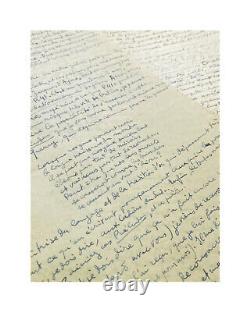
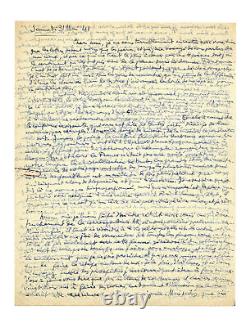
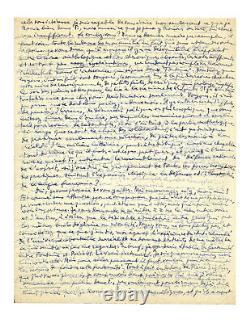
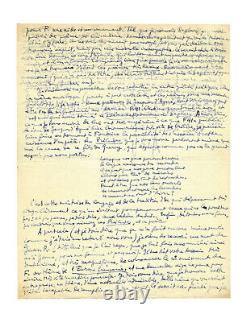
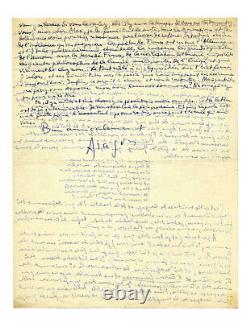


Autograph letter signed "aragon" to max-pol fouchet, director of the magazine fountain to alger s. L Saturday 31 May [1941], 4 p.
Grand in-4° old trombone trace on the first sheet and small pin hole. "41" added a larger writing to the pencil (this is likely a reference to max-pol ferchet for the archiving of the letter).Long and magnificent letter written under occupation and enriched by a poem between gravity and optimism, the poet assists the editor of the magazine Fountain for an editorial purpose and then nourishes the hope of mutual help and fraternal ties between the first foyers of the resistance of the letters. « Saturday, May 31, 41. Dear friend, I feel awfully much left with you, although the letters say less than the poems, and that I have tried to talk to you about my best, and about what is most dear to me by these 4 poems. Of which I have the feeling that they have taken a good place in the last fountain. It's this last fountain, but I have to decide to talk to you.
I have done so much here with all the meeting people, that in addition to the difficulty of writing things instead of saying them I am also ashamed to repeat myself for the hundredth time. It is a very great success, an enlargement that could be believed to be unrealizable from your horizon. The brilliant of this summary is a promise of what will follow, I want to believe it and everyone takes it that way. This is the danger that there are such blasts: here you must stand at this level, do not descend below yourself.
And this because of the growing confidence that you have on all sides, will I say mine? You're in charge of the mission. Of the highest mission ever. Never have poetry, the French culture of which we are the unworthy depositors, been the test of an era like this one. To find an example, go back to the Middle Ages, and then France was not a unit formed, nor was our language the crystallization of all the great ideas of the world. The trials of our country are those of the darkest times, but what is put today is a million times more precious than what would then disappear and that has survived. I don't know if what I'm saying doesn't sound disproportionate, but I care! And the place I think I see assigned to a magazine as f[ontain] at the time it is, it may be just a dream on my part. But then I dream, and I dream well.So I am very angry to be reduced with you to the poor means of correspondence. Ah, if we could talk together. But finally, one must resolve to life as it is. The certain is the deep desire that I have to help you in any way in your task, and not only with this false generosity of the collaborator who puts from time to time a poem under wrapping, and so go.
Woe is that I am not rich and that I can only offer you to do the restage around me. I'm doing it, by the way, and if you send me some more flyers, I might be able to do better.
I hardly dare to tell you that besides many and old experiences, twenty-three years to do magazines. I have the illusion that, if necessary, this experience can be communicated. But know that if you are interested I am able to write to you not only what I find good in f[ontain], but also what I can find there or wrong, or absent, or insufficient. In this last issue, for example, it is necessary to see all the harshness of my friendship to the fact that without waiting for your answer I will tell you that in my opinion there is a striking imbalance between the anthological journal and the absent chronicles, the insufficient notes and especially not sufficiently systematic, not accounting for the intellectual movement in the interval that separates two fountains.You know that people, it's a fact, always go, the summary read, at the end of the reviews look for this wealth of information, small facts, criticism, which prolongs, amplifies the sound of poems and prose, binds them to the very life of the mind. There is already an attempt in this direction in your home.
Come on, it didn't seem like anything you're talking about in two months. There have been all kinds of efforts, thoughts, mistakes, poetic or philosophical approaches that you let go in the shadows, on which the next issue will be very late to return. The dreadful, if one adheres to the anthological part, so wide that it is the choice of collaborators, is that one risks to practice only a selection, to lend his hands to the creation of a literary milieu, perhaps distinguished, but a chapel nevertheless. What is necessary is not to practice, thanks to the real weapon which is fountain, among other things, the national defence of the mind, if I may say so, the grouping of all forces capable of practising, according to the classical expression, the defence and the illustration of the French language? Yes, I suggest you help yourself.But encourage me, my friend! And as without waiting I will prove to you that nothing is on my part platonic, I want to address a question, perhaps a little to the side, but which is important to me. I ask you to help me be the link between you and others, to avoid the desirable emulation between people who have the same goals degenerate into rivalry. You see, don't get angry, and consider that what I say, my age, and the scalded cat experience of the surrealized bottle-universe give me the right to meddle in what seems not to look at me. In short, I would like to establish the fraternity between fountain and poetry 41.
I know you can't have anything against that. But to go further, we must positively want the means to found this fraternity. Quite apart from segher stone. That I have seen these days, I send you two poems of him which I ask you to publish in f[ontain], not only for the reason already said but because I find these poems magnificent, and that they will be for f[ontain] a help and an ornament.Such as I know seghers who does not publish poems of himself in his magazine that as much as we heel him and force him there, he would not have sent them to you, and not out of disdain or evil spirit, but by incredible modesty. It would be nice for you to give him that shoulder that would give him a little confidence in him, and he needs it. Understand that I would never write this to you if I did not first find these poems very beautiful. Especially the second (which does not have a title, and it would be very nice to write to seghers to ask him for one). I'll also allow myself to take you down another poetic game.
In the same envelope (apart from this letter, and the poems under a second envelope), I put two poems of aymé jacques, whose signature you may have seen at the last p[oesie] 41. He's a great friend of mine, and I was the one who gave this November poem to seghers. In my opinion, what I send you from him is far superior to what p[oesia] 41 has published. The name of yesterday unknown aymé jacques risks to shine very quickly, I think to do well by giving fountain the possibility to associate with this birth of a poet.
The preludes I'm sending you will speak to you, will you plead? Better than me the cause of this fds child? Quercy, which expresses as not one the great hope that we carry: when our eyes can see again the long birth of the world, our eyes may succumb dazzled by so many mirrors and defeated by so many revenges. Maybe our open arms will break as the branches break in the winter wind? It is this mastery of the language and tradition of oc that surpasses very singularly what those who do not possess it pompously write!
And I think, I have to say, to the southern notebooks. Finally, with all my strength, I would like you to love these preludes, and this poet.
Apart from that (and I have to say that it made me feel even better as I was late with you) I just received a word of jean r [orry]. Tell him I've received it, that I'm making friends with him and yvonne.For my wife and for me. He tells me your very ambitious, and very beautiful, plan to devote the next n. Of f[ontain] to the theme of the French Europe, and asks me if I can not write an article for it very quickly.
I must tell you that I find this undertaking, this theme, of admirable topicality, even as we fear that we will be unable to fill such a framework. I'd be proud if I could help you. If you want it, and if there's time.
If you ask me, you, my dear max, I will do it right away, in the dimensions and deadlines that you could assign me by the return plane. I would like to write of the influence that in the Middle Ages the poets of France had on Germany and Italy in particular, and beyond, the birth of the great symbols of love on the land of France, of the civilization of love that precedes the great philosophies of light on the roads of Europe, and that come from home. The whole mixed with a few ideas about the then closed art, and its similarities with the poetry imposed on us by today's events.
Finally, it would be to write and not to tell. But maybe you'd rather space my name in your abstracts? Don't bother telling me. Oh, there's a thousand things I still want to tell you. This letter is already endless.I'll put this back at once next. And then the post is badly done for the most part: I tell you, we can only write it in verses. This letter, the first - and without a doubt the most important - of the nine known poet to max-pol fouchet, director of fountain, comments part of his important contribution past and to come to the magazine Algeroise, and then reports on his ideological and editorial expectations. In an excess of optimism, no doubt, aragon wanted to be involved in the review, but his illusions would be seriously glazed as early as the second half of the same year.
This blurring between the poet and his correspondent will become definitive a few months later. It is partly explained by the emergence of phenomena of competition between literary journals (fontaine and poetry 41) and the fear of louis aragon to see the poetic field hostile to the regime of vichy fragment.
Indeed, his poetic writing takes the form of a patriotic commitment. Whether it is poems composed during the "droit de guerre" and gathered in 1941 in the "crève-cour", or other writings during the Nazi occupation and assembled in 1944 in the "French diane", the poet denounces the conflict in both cases and attests to a deeply marked lyricism, coming from the suffering of being separated from his wife as well as from the horrors of war.He would never stop denouncing Nazi crimes and encouraging the French to unite around a common goal: resistance. 1- "the poem interrupted", "free zone", "richard ii forty" and "elsa je t'aime" are the subject of a pre-publication in the magazine Fountain, n. Shortly afterwards, they are taken up, in a different order, in the crève-cour, whose finished printing is of 25 April 1941. 2- that is to say in 1918, the year when aragon signed his first texts in north-south and s. Undeniably since then he not only gave numerous periodicals a constantly abundant and diversified collaboration, but he "made" magazines, in the sense that he designed, animated, realized them.
At the end of September 1940, while staying with Joë bousquet à carcassonne, aragon received the visit of the poet stone seghers, ten years old, his younger, who became his devoted and close friend.. until then director of casqué poets, where aragon had published, in the April issue, "the rhyme in 40", stone seghers founded a new magazine, poetry, to which aragon made a regular contribution, in parallel with the magazine fountain. 4- the southern notebooks were born in 1925, from the recast of the literary magazine Fortunio which had been created since 1913 in marseille around marcel pagnol, then from jean ballard.André Gaillard, close to the surrealists, is the craftsman of this transformation. In the 1930s, the magazine Carcassonne shipyards, animated by joë bousquet, will forge close links with the southern notebooks. While aragon here expresses reservations about this magazine, joë bousquet regularly collaborates there since 1928-29. In 1942 he wrote in particular an article on fountain and the notebooks of the rhône. 5- Jean kingre had bonded with friendship before the war with aragon, which he had met with the French Communist Party.
From 1936 to September 1939, he worked with gazes, weekly illustrated, as editorial secretary, with unik stone. Reading in the window of an Algerian bookseller the editorial of n. 10 (July-August 1940), "we are not defeated", and immediately seduced by the tone, he presented himself to max-pol fochet who had immediately hired him as administrator of the magazine fountain.
6- Yvonne genova, professor of philosophy and collaborator of the review fountain for the critical part, was the companion of Jean Roire. It had been brutally revoked, without treatment, by the Vichy government as early as September 1940. 7- this flash passage in which precise intentions and circumstances aragon undertakes to write "the lesson of riberac or the French euro" whose publication in June 41, in the 14th issue of fountain to alger, increases the influence of the magazine by its resounding in france.
The world of max-pol ferchet, vichy 1976, n°380. Cross searches n°8 - aragon elsa triolet, ed. Augustin guillot et nathalie limat-letellier (2002), presses universitaires de strasbourg, p.
215-220 The comments in this leaflet are from the book. This item is in the category "collections\letters, old papers\autographs\others". The seller is "laurent-autographs" and is located in this country: fr.This item can be shipped to the following country: whole world.
- number of pages: 4 Period: Second World War
- subtype: autograph on paper
- theme: literature

